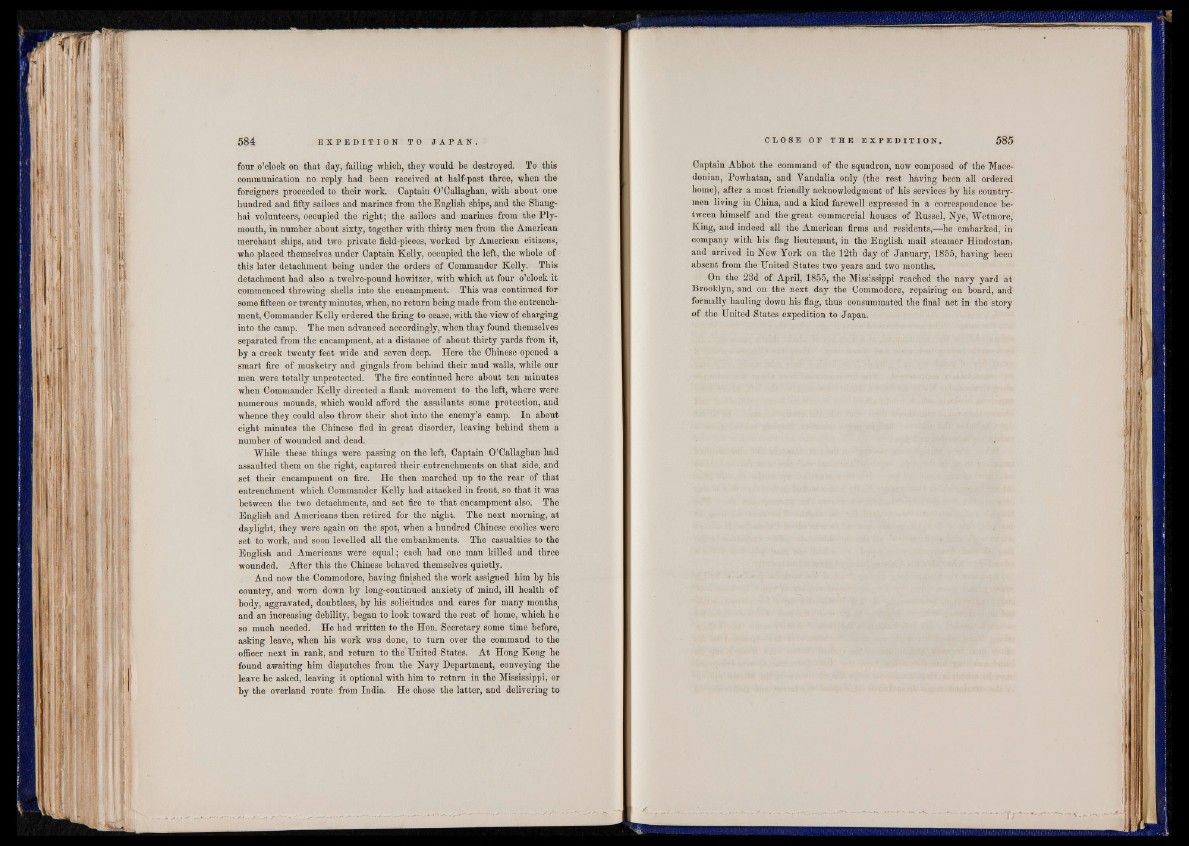
four o’clock on that day, failing which, they would he destroyed. To this
communication no reply had been received at half-past three, when the
foreigners proceeded to their work. Captain O’Callaghan, with about one
hundred and fifty sailors and marines from the English ships, and the Shanghai
volunteers, occupied the right; the sailors and marines from the Plymouth,
in number about sixty, together with thirty men from the American
merchant ships, and two private field-pieces, worked by American citizens,
who placed themselves under Captain Kelly, occupied the left, the whole of
this later detachment being under the orders of Commander Kelly. This
detachment had also a twelve-pound howitzer, with which at four o’clock it
commenced throwing shells into the encampment. This was continued for
some fifteen or twenty minutes, when, no return being made from the entrenchment,
Commander Kelly ordered the firing to cease, with the view of charging
into the camp. The men advanced accordingly, when thay found themselves
separated from the encampment, at a distance of about thirty yards from it,
by a creek twenty feet wide and seven deep. Here the Chinese opened a
smart fire of musketry and gingals from behind their mud walls, while our
men were totally unprotected. The fire continued here about ten minutes
when Commander Kelly directed a flank movement to the left, where were
numerous mounds, which would afford the assailants some protection, and
whence they could also throw their shot into the enemy’s camp. In about
eight minutes the Chinese fled in great disorder, leaving behind them a
number of wounded and dead.
While these things were passing on the left, Captain O’Callaghan had
assaulted them on the right, captured their entrenchments on that side, and
set their encampment on fire. He then marched up to the rear of that
entrenchment which Commander Kelly had attacked in front, so that it was
between the two detachments, and set fire to that encampment also. The
English and Americans then retired for the night. The next morning, at
daylight, they were again on the spot, when a hundred Chinese coolies were
set to work, and soon levelled all the embankments. The casualties to the
English and Americans were equal; each had one man killed and three
wounded. After this the Chinese behaved themselves quietly.
And now the Commodore, having finished the work assigned him by his
country, and worn down by long-continued anxiety of mind, ill health of
body, aggravated, doubtless, by his solicitudes and cares for many months^
and an increasing debility, began to look toward the rest of home, which he
so much needed. He had written to the Hon. Secretary some time before,
asking leave, when his work was done, to turn over the command to the
officer next in rank, and return to the United States. At Hong Kong he
found awaiting him dispatches from the Navy Department, conveying the
leave he asked, leaving it optional with him to retnrn in the Mississippi, or
by the overland route from India. He chose the latter, and delivering to
585
Captain Abbot the command of the squadron, now composed of the Macedonian,
Powhatan, and Yandalia only (the rest having been all ordered
home), after a most friendly acknowledgment of his services by his countrymen
living in China, and a kind farewell expressed in a correspondence between
himself and the great commercial houses of Russel, Nye, Wetmore,
King, and indeed all the American firms and residents,—he embarked, in
company with his flag lieutenant, in the English mail steamer Hindostan,
and arrived in New York on the 12th day of January, 1855, having been
absent from the United States two years and two months.
On the 23d of April, 1855, the Mississippi reached the navy yard at
Brooklyn, and on the next day the Commodore, repairing on board, and
formally hauling down his flag, thus consummated the final act in the story
of the United States expedition to Japan.